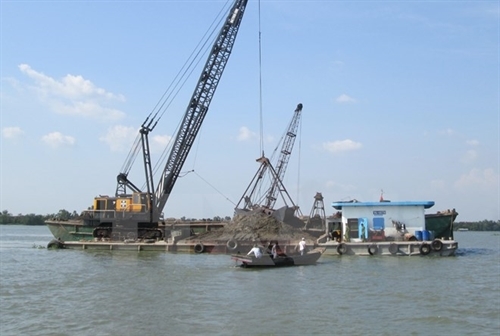

Lots of sand has been mined in the Cửu Long River.
Perhaps too much.
This has led to the Tiền and Hậu rivers in the Cửu Long Delta becoming deeper every year.
Some people want this sand mining to stop.
 |
| Erosion issue: A barge illegally mines sand in the Tiền River in the Cửu Long (Mekong) Delta province of Bến Tre. — VNA/VNS Photo Hưng Thịnh |
Lots of sand has been mined in the Cửu Long River.
Perhaps too much.
This has led to the Tiền and Hậu rivers in the Cửu Long Delta becoming deeper every year.
Some people want this sand mining to stop.
HCM CITY — The Tiền and Hậu rivers in the Cửu Long (Mekong) Delta have become deeper in recent years instead of having silt build-up like in years past, experts have said.
The 250-kilometre-long Tiền and 200-km-long Hậu, tributaries of the Mekong, are two major rivers in the delta, which is the country’s largest rice, fruit and seafood producer.
Hoàng Văn Hùng, head of the Việt Nam Inland Waterways Administration South Branch, said their depth had been increasing faster since 2008, now at an average of three to seven metres.
The situation was occurring along their entire lengths, he was quoted as saying in Tuổi Trẻ (Youth) newspaper.
Nguyễn Hữu Thiện, an ecologist based in the delta, attributed the deepening to excessive sand mining and the impacts of hydropower dams upstream.
“Hydropower dams along the Mekong in China have caused a 50 per cent reduction in fine grained sediments in the delta,” he said.
Delta provinces were exploiting the Mekong uncontrollably, he added.
Lê Mạnh Hùng, deputy head of the Department of Irrigation, said in 2013 he presided over a research project on the impact of sand mining on the Tiền and Hậu rivers.
The delta provinces’ zoning plans for sand mining have not considered whether the mining could cause erosion of the river bed while mining process is not appropriate and does not safeguard river banks and beds from erosion, according to Hùng.
Besides, the provinces only estimate the reserves of sand and grant licences without evaluating the volume of sediments washed from upstream areas.
“With the current mining volume, the delta will mine all sand reserves in the Tiền and Hậu rivers in less than 30 years.”
Huỳnh Yến Vân, deputy head of the Bến Tre Province Natural Resources and Environment Department’s Hydro-meteorology and Marine Resources Division, said a recent department study found that silt build-up in the Tiền, Hàm Luông and Cổ Chiên rivers was very slow and even absent in some places.
While silt deposits normally recover over a period of time, it is not happening now as a result, according to the study.
In Bến Tre, the provincial Fatherland Front earlier this month informed the People’s Council that the public opposed a plan to dredge a passage in the Tiền River in Chợ Lách and Châu Thành districts.
The Tiền Giang Province People’s Committee has stopped issuing licences to mine sand in the Tiền to ensure the river bed and banks are not eroded.
However, three companies have been licensed by the Ministry of Transport to dredge a stretch of the river from its mouth to Đồng Tháp Province.
Earlier this month Tiền Giang petitioned the ministry to stop existing sand mining projects and not grant any new licences.
The Đồng Tháp People’s Committee has also petitioned the ministry not to dredge a passage in Châu Thành District’s An Hiệp Commune and Cao Lãnh District’s Bình Thạnh Commune.
Đinh Công Sản, deputy director of the Southern Institute of Water Resources Research’s Centre of River Training and Natural Disaster Mitigation, said some provinces in the delta stopped issuing licences to mine sand.
The Government should study and identify areas where sand can be mined while also ensuring easier transportation there, he said.
Sản said a major programme that would cost 1 million euros and be funded by the EU would study erosion in the delta’s coastal areas.
All issues such as the impact of less silt carried down the Mekong to the delta, sand mining, climate change and rise in seawater levels would be evaluated, he said.
“Based on the evaluation results, sustainable solutions will be found.” —VNS
GLOSSARY
The Tiền and Hậu rivers in the Cửu Long (Mekong) Delta have become deeper in recent years instead of having silt build-up like in years past, experts have said.
Silt is sand and other things that come together when they are washed up by water.
The 250-kilometre-long Tiền and 200-km-long Hậu, tributaries of the Mekong, are two major rivers in the delta, which is the country’s largest rice, fruit and seafood producer.
A tributary of the Mekong is a river that flows into the Mekong.
A delta is a flat area near the coast where a river splits up into many rivers before it enters the sea.
Nguyễn Hữu Thiện, an ecologist based in the delta, attributed the deepening to excessive sand mining and the impacts of hydropower dams upstream.
An ecologist is a scientist who studies and knows a lot about how different living things, such as plants and animals, all live together and live off one another.
If Nguyễn Hữu Thiện attributed the deepening to mining and hydropower dams, he means that these two things have caused the deepening.
Excessive means too much.
The impact of dams on the river means the way that the dams affect the river when they are built on it.
Hydropower dams are dams that are built to make power (electricity) from the energy captured by fast flowing water that is released from them.
“Hydropower dams along the Mekong in China have caused a 50 per cent reduction in fine grained sediments in the delta,” he said.
If there is a 50 percent reduction in fine grain sediments, there is 50 percent less of it.
Fine grained sediments means silt made up of very small grains.
Delta provinces were exploiting the Mekong uncontrollably, he added.
Exploiting means getting the very most out of something.
Lê Mạnh Hùng, deputy head of the Department of Irrigation, said in 2013 he presided over a research project on the impact of sand mining on the Tiền and Hậu rivers.
To preside over a project means to be in charge at the project’s meetings.
The delta provinces’ zoning plans for sand mining have not considered whether the mining could cause erosion of the river bed while mining process is not appropriate and does not safeguard river banks and beds from erosion, according to Hùng.
Erosion happens when earth and rock are forced into different shapes by the force of wind, water and other things.
Appropriate means suitable.
Safeguard means protect.
Besides, the provinces only estimate the reserves of sand and grant licences without evaluating the volume of sediments washed from upstream areas.
To estimate means take a careful guess.
Reserves of sand are amounts of sand that are available to be mined.
To evaluate the volume means to come up with an idea of what it is.
Huỳnh Yến Vân, deputy head of the Bến Tre Province Natural Resources and Environment Department’s Hydro-meteorology and Marine Resources Division, said a recent department study found that silt build-up in the Tiền, Hàm Luông and Cổ Chiên rivers was very slow and even absent in some places.
Absent means not present. In this case it means there is no silt build-up.
In Bến Tre, the provincial Fatherland Front earlier this month informed the People’s Council that the public opposed a plan to dredge a passage in the Tiền River in Chợ Lách and Châu Thành districts.
If the public is opposed to a plan, they do not think it is a good idea and they are against it.
Earlier this month Tiền Giang petitioned the ministry to stop existing sand mining projects and not grant any new licences.
To petition the ministry means to ask them to stop the existing mining projects and to have a letter with the signatures of people who support the idea of stopping them as part of what you present to the ministry.
Sản said a major programme that would cost 1 million euros and be funded by the EU would study erosion in the delta’s coastal areas.
The EU stands for the European Union, which is a group of countries in Europe that have come together to be like one big country.
“Based on the evaluation results, sustainable solutions will be found.”
A sustainable solution is an answer to a problem that will solve the problem forever.
WORKSHEET
State whether the following sentences are true, or false:
© Duncan Guy/Learn the News/ Viet Nam News 2016
1. True; 2. False; 3. False; 4. False; 5. True.




